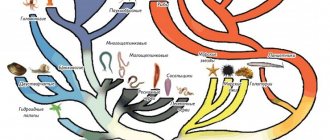Agronomic professions
All agronomic professions involve growing plants. An agronomist organizes agricultural work taking into account local conditions, determines methods of soil cultivation, type and amount of fertilizers.
An agrochemist studies soil processes, their relationship with plants, and the effect of fertilizers on soil fertility.
A plant protection agronomist specializes in pest and weed control technologies.
An agroecologist develops ways to obtain high-quality products with minimal impact on the environment, deals with the problem of soil restoration and processing of agricultural waste.
Summary of the lesson “Agricultural professions” (senior group)
Summary of the lesson “Agricultural professions” (senior group)
Objectives: Educational: to reinforce with children the names of agricultural professions, to expand knowledge about work in the village;
Developmental: to form the moral qualities of the child’s personality: independence, respect for work, patriotism; develop speech, enrich children’s vocabulary, continue to develop memory, attention, thinking, develop cognitive interest
Educational: to cultivate a love of nature, to cultivate respect for working people, to cultivate interest in blue-collar professions
Preliminary work. Reading
fiction: (stories by L.F. Voronkova “Sunny Day”, V. Sokolovsky “Milk River, Kiselnye Banks”, K.D. Ushinsky
"Caring Cow"); examination of reproductions of paintings by artists: A. Plastov “Summer”, I.I. Shishkina
"Rye"; reading poems by writers: A.A. Fet “The rye is ripening over the hot cornfield...”, E. Trutneva “Golden Corridor”; conversations about pets in rural areas. Excursion to the farm SPK PMZ "Dmitrievy Gory"
Equipment. Illustrations, pictures of people in the professions of animal husbandry: milkmaid, calf shepherd, veterinarian, shepherd, machine operator; pictures of cows, a herd of cows, a farm, a milking machine; multimedia projector with a presentation about professions on the farm; tape recorder for physical education.
Educator: Once upon a time, people
They learned not just to hunt animals, but to specifically breed them. This activity is called agriculture. Agricultural workers need to know a lot about plants and animals, be able to properly grow and care for them. But the main thing, guys, is that more than anything in the world you need to love the earth. Without this you cannot achieve good results.
Agricultural workers put a lot of work into growing a good harvest, so that domestic animals produce more milk, meat, and eggs; Their work is not easy, it takes a lot of effort and time. Nowadays, agricultural workers' work is made easier by technology, which they must understand well. After all, to plow the land
To sow grain, to cut hay to feed cows, sheep and horses, you need to be able to handle special equipment: tractors, mowing machines, combines, watering machines. Therefore, agriculture cannot do without special professions. Today we will get acquainted with different
our professions in the countryside.
Educator. Guys, do you like to solve riddles? Guess it!
White water
It will be useful to all of us. From white water
Do whatever you want: Cream, yogurt, Butter for our porridge, Cottage cheese for a pie - Eat it, Vanyusha - my friend! Eat and drink, serve for the guests, and don’t be sorry for the cat!
Educator. That's right, you guessed it, it's milk. Where does milk come from? Guess the riddles and you will immediately find out.
Educator. “It’s motley, it eats green, it gives white,” “In the middle of the yard there is a haystack: in front there is a pitchfork, in the back there is a broom.”
Children. A cow, she gives milk. Educator. Of course, this is co-
mova. What animal is a cow? Why?
Child. A domestic animal lives near a person’s house, and the person takes care of it.
Educator. One cow produces as much milk as one family needs. Where can we get milk to feed all the children in kindergarten, all the big cities, since milk is on our table every day? (Children’s answers)
Educator. Large farms are being created in villages, where many, many cows are kept. They are looked after by special people from different professions. Today we will get to know them.
Round dance game “We walked through the woods”
We walked through the woods
And we met a matryoshka. (children walk in a circle)
“I’m tired,” she says (palms pressed to cheeks)
My leg hurts (hands on my belt, shaking my leg)
You, matryoshka, don’t be sad! (pat the neighbor standing next to him on the shoulder) You need to rest! (squats,
hands under the cheek)
And then get ready
Then hit the road by car! (walk in a circle)
Children sit on chairs.
Educator. A long time ago, people learned to specifically breed domestic animals. This type of human activity is called animal husbandry.
(Show children pictures of a farm)
Educator. A milkmaid and a machine operator work at the farm to care for the animals. The machine operator prepares feed for the animals and ensures that all mechanical equipment works on the farm.
Educator. Who knows what cows eat?
Children. In summer - grass, in winter - hay.
Educator. That's right, but not only this, cows need a wide variety of food.
What have we learned?
Agriculture is the main part of the agro-industrial complex. There are professions for every branch of agriculture. In the message “Professions of Agriculture” for 3rd grade children in a lesson on the world around us, you can list the professions: agronomist, vegetable grower, soil scientist, livestock breeder, poultry farmer, livestock specialist, tractor driver, combine operator and others.
Previous
The world around usStructure of the human body - how the organ system works, features and functions briefly for children (3rd grade, world around us)
Next
The world around us Gray forest soils - types, characteristics of natural zones, description of climate and properties briefly (grade 4, world around us)
Sectors of the economy: agriculture
Agricultural professions will always be in demand!
Read: 4 min.
Which direction of study should I choose? What sector of the economy should I work in? What is happening today in Russian agriculture? How promising is it to work in the agricultural industry? What competencies do future agricultural specialists need to develop?
While the country is harvesting the harvest, and the Ministry of Agriculture, farmers and ordinary gardeners are worried about its quantity and quality, we will talk about professions in agriculture
.
What is agriculture
Agriculture
- a branch of the country’s economy that provides the population with food (food, food).
Agriculture closely interacts with other industries: it supplies the textile industry with raw materials (flax for fabrics and animal skins for leather production), uses advances in biochemistry (mineral fertilizers and pesticides) and mechanical engineering products (tractors). All industries that are involved in the production, processing and delivery of agricultural products to consumers are usually united under the concept of the agro-industrial complex
.
What is included:
crop farming, livestock farming, feed production, mushroom growing, gardening, etc.
Examples of professions:
agronomist, veterinarian, breeder, beekeeper, livestock specialist, tractor driver, combine operator, agricultural machine operator (manages all types of agricultural machinery), farmer, milking machine operator
Agriculture in Russia
For our country, the agricultural sector plays a vital role. Due to the vast territory and climatic differences between regions, the country can fully provide itself with food with the greatest possible variety and also develop exports. In the south of Russia, grains, tea, and fruits are grown; in the north, livestock farming is successfully developing. Over 10 years, Russia has increased exports of agricultural products 6 times. Russia contains 10% of all arable land in the world. Interesting:
Russia ranks first in the world in exports of wheat, rye, oats, barley, sugar beets, sunflowers, and buckwheat. We are also a leader in the production of currants and raspberries





